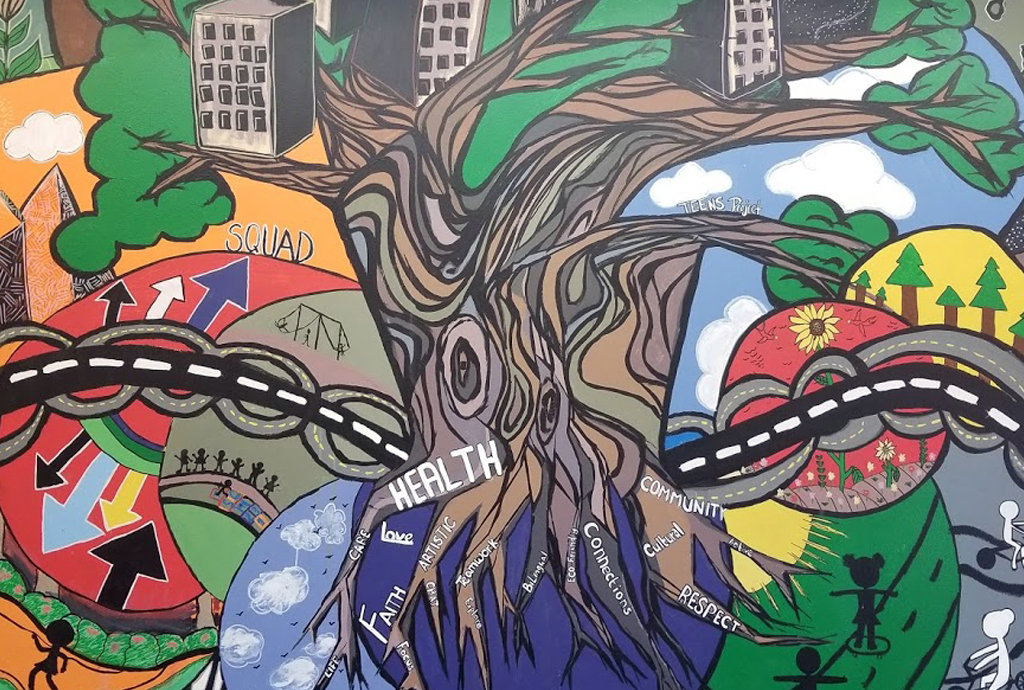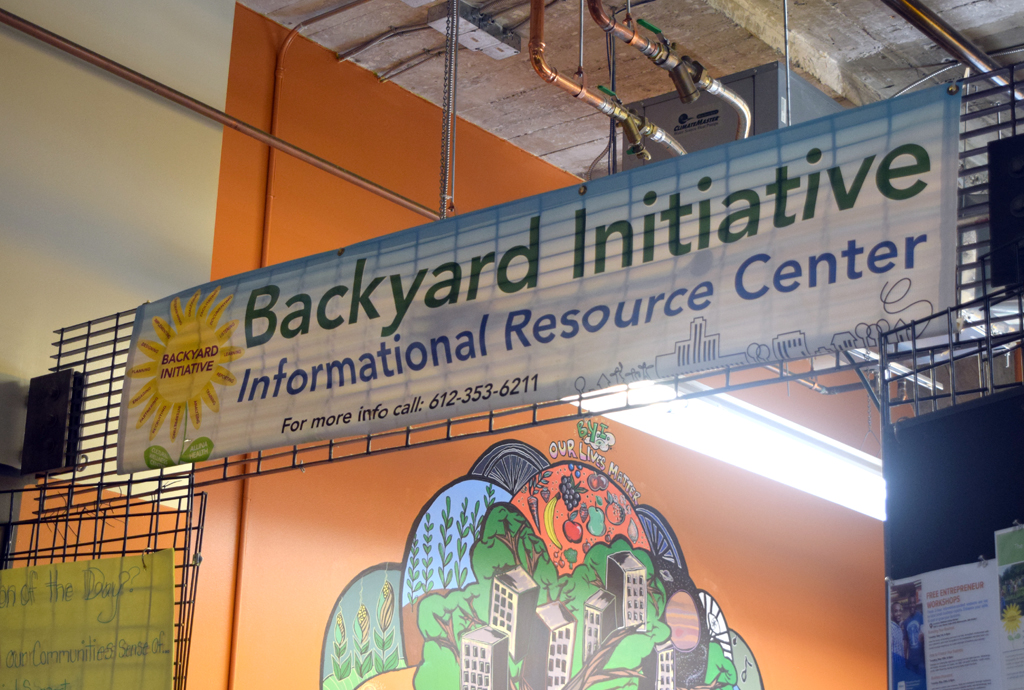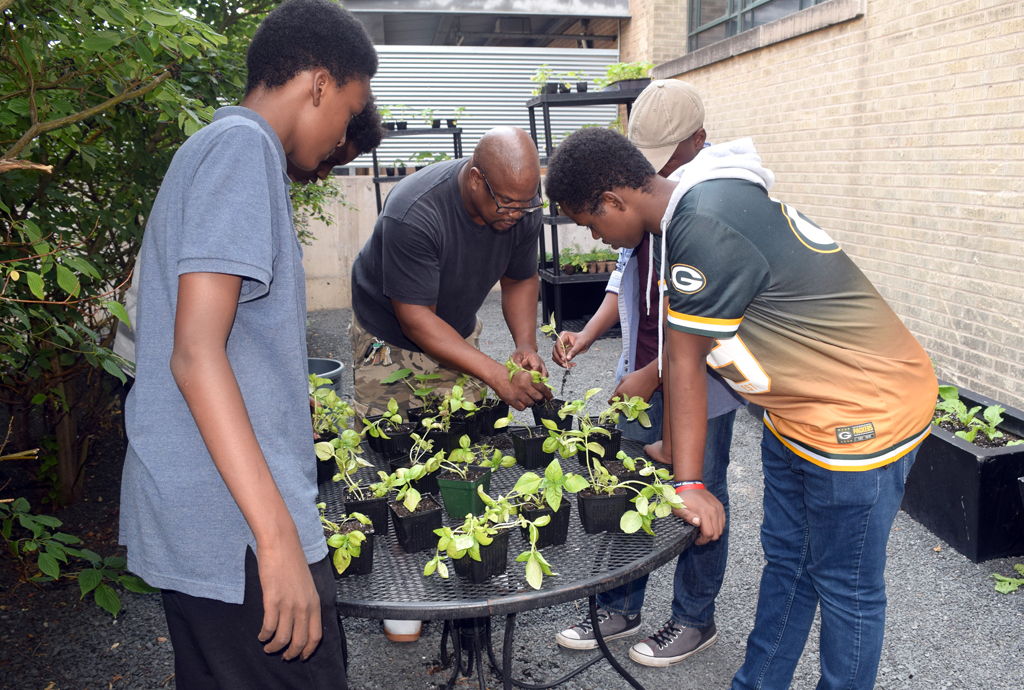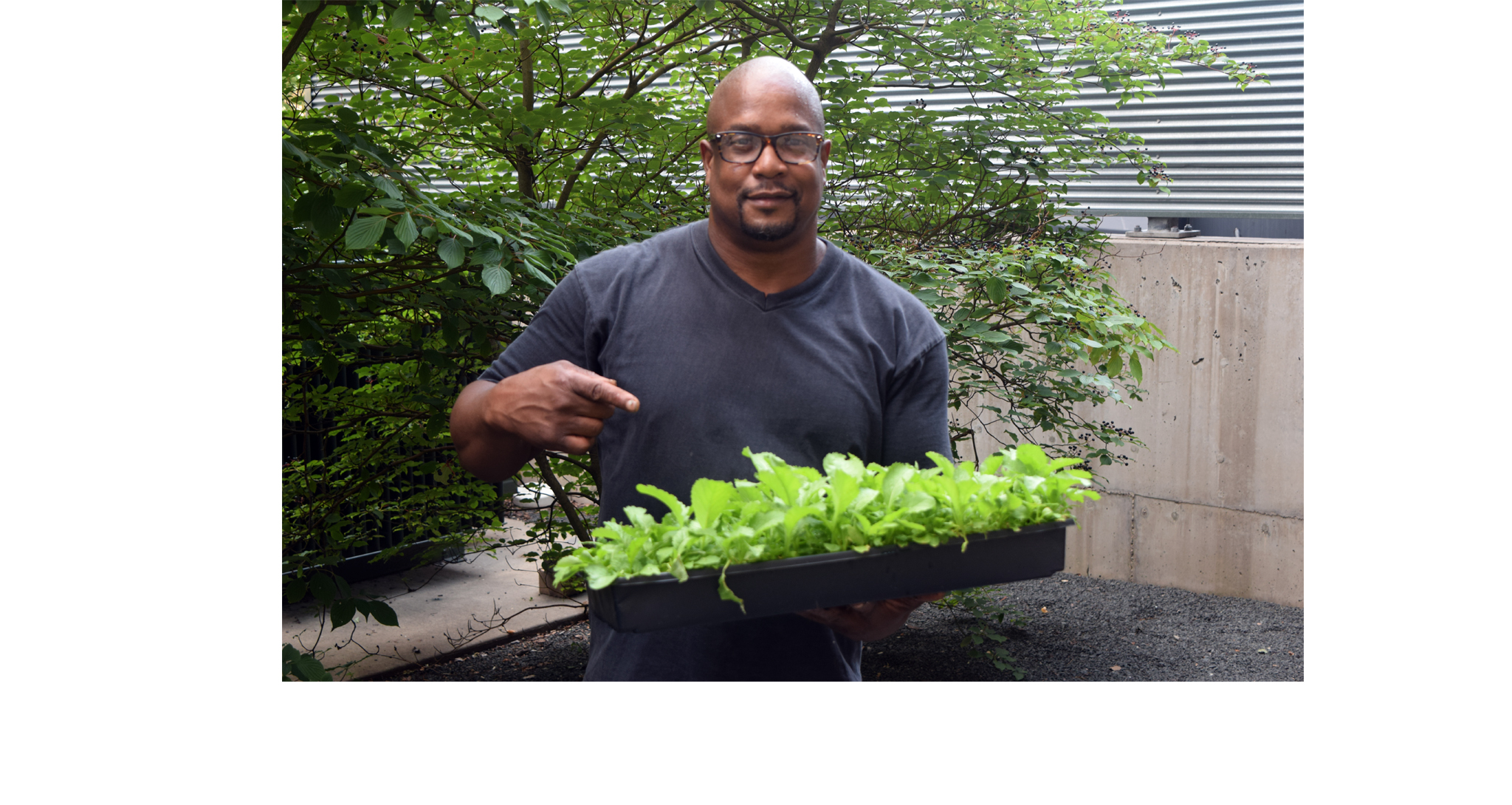

A community isn’t just a grid of streets and houses. More important than that, it’s a collection of people and the neighborhoods they share. And in that shared experience, there’s power. A positive sense of community, and the behaviors of its people, can directly and radically shape the health of everyone living there.
This idea that community is a health determinant is what prompted Allina Health, the Cultural Wellness Center, and residents from seven Minneapolis neighborhoods to launch The Backyard Initiative (BYI) in 2009.
BYI is an ambitious health and wellness initiative that’s trying to improve outcomes within the seven-neighborhood community it comprises. But unlike similar initiatives that are driven by governments or corporations, this one is driven by the community.
Unlike many health and wellness initiatives that are driven by governments or corporations, The Backyard Initiative is driven by the community.
“BYI is a community caregiving initiative,” says Minkara Tezet, a community research fellow at the Cultural Wellness Center. “What that means it that the people who are in the community have come up with ideas that will help create health.”
Those ideas then spawn services, products, and activities that are carried out by Community Health Action Teams. They include free vegetable giveaways, diabetic support groups, poetry performances, career mentorship, and non-toxic cleaners.
“There is no BYI without the people who live here,” Minkara says. “That’s the only way it exists.”
In this interview, Minkara Tezet and four other BYI members — Rose Lobley, Mark Anderson, Janet Court, and Roberta Barnes — talk about why they joined BYI, their most memorable moments, and the tie between health and community.

Rose Lobley: What attracted me is that someone listened to me. They wanted to know what I wanted to see happen in the community. I was sick. I’m still sick, but I’m doing much, much better than what I was.
Mark Anderson: I’m with the Barbara Schneider Foundation. We work with police who respond to crisis calls. When a person is in crisis part of that crisis can be a health problem or diagnosis. I got involved in BYI because it’s about preventing crisis. Keeping people healthy and using those resources that are right in the community which are so often overlooked.
We have this idea that “health care providers” are going to provide us health, but health is a state of being that you achieve in your community through self-knowledge, connection to culture, and other things. There is that medical piece, but it is much broader and holistic than that when it comes to preventing a crisis.
Janet Court: Western medicine has never worked very well for me. I’m allergic to almost all western medicines so I’ve always had to create my own through herbs. Sharing that information with others is what drew me to BYI.
Minkara Tezet: I’ve lived in The Backyard for five years. When I first got here I didn’t realize that community is a measure of health. Community is a measure of health that’s invisible in society. I didn’t realize I didn’t have community.
It was a process of us learning to live together. No matter what we’re going through we support each other. The people around you teach you how to take care of yourself.
When I came in I was a smoker, I didn’t exercise, and I had a lot of bad health habits. In the process of being around people who were healthy, and who wanted to be healthy, people who were living past 60, I got a different frame on everyday life. People live for a long time if they have a lot of support around them.
In the ‘60’s and ‘70’s community were decimated in the United States. The BYI is an effort to rebuild something that was intentionally destroyed and that we can intentionally create for ourselves. Health is a revolutionary concept.
People do not think community can produce health because they don’t have it.


Anderson: I had a conversation with some young people and they asked about life expectancy, about how long they were going to live. These young people had an idea that life was really short and that they were at risk at every moment — and a lot of them were, unfortunately. Listening to what they were dealing with, what they’re trying to get past to become an adult and a member of their community and have their own future and family, it was a powerful moment.
Lobley: The young kids that Mark is talking about used to come to my backyard. I used to do National Night Out and barbeques. A lot of them were homeless. I would load them up in the van and take them to a Rite of Passage class and all those girls and two boys graduated high school. For the BYI to be 10 years strong and still coming to life, I love it.
Court: We had a gathering at the park on Franklin and Chicago and the BYI gave away food to some of the people I knew. It never dawned on me that the people I knew needed support, too. This was so unique because they cooked food and gave food away.
Tezet: I have too many examples. It literally brings me to tears. I say sometimes that if it wasn’t for the Backyard Initiative I don’t know where I would be. The Backyard Initiative is where you find health.
Two years ago we were in my backyard building boxes to grow produce. I could see those boxes from my window. Everyday I’d go to bed and would look at them and imagine what was going to grow in them.
The first year it didn’t really take off, but this past year I kept on thinking about it all winter. And finally spring came and it happened. It took 2-3 years for that to happen. People think health is instantaneous, but it’s a journey.
The BYI has done everything for me. The fact that I walk three times a week, that I drink more water. I’m more concerned about what I eat, when I eat. These are things you think everyone thinks about, but in a society where individualism is everything you never see all the resources you have in the community.



Anderson: I work on issues about people in crisis. But I think communities can be in crisis. This idea of community healing is so powerful and it’s not respected by all these experts. It’s treated like an afterthought, but it’s the basis of humanity. Always has been. For thousands and thousands of years, community is what made it possible. We have this idea that we can get away from it, but the reality is that we need community. When we have strong community people are happier and healthier.
The BYI is a small project, but it’s enormous in terms of its potential.
Roberta Barnes: The reason we don’t just rely on the “experts” is that we believe everyone is a teacher and a student. Everyone has something valuable to contribute to the fabric of the whole. We believe that everyone has a spark. Everyone has what they need on the inside of them. The work of the BYI is to ignite that spark. Once that spark is ignited that person has the ability to take care of themselves — mind, body, and spirit.
So many times we talk about systems. Systems erect barriers; BYI eliminates barriers. We create access. We create an open environment and a space for healing …
I did an interview with a woman who, at one time, weighed 350 pounds. She went to the doctor and had all types of ailments. She had this feeling of hopelessness. She felt completely alone. She just happened to read about BYI. She got connected and started exercising. When she first started she couldn’t do a lot of things, but the instructor told her, ‘Just do what you can do, the important thing is to get moving.’ Then they told her about eating healthy, adding more vegetables into her diet. She went to Growing the Backyard. They give away free vegetables to people in the community. She started going every week. She also went to A-POD, a diabetic support group. She went all over The Backyard. When she called the Community Wellness Center. She talked to Brother Minkara and he told her, “You can talk charge of your own health and your own outcomes. You just have to believe yourself.”
She’d never worked a day in her life. Then she got connected and started going to Rebirthing Communities, which is about economics in The Backyard. They were creating lanterns with yarn and glitter. She realized how creative she was. She went back home and started making afghans and baby blankets. Now this woman who is low-income, always lived and dwelled on the system, sells the products she makes. She’s completely financially independent of any systems. She is under 150 pounds. And she’s giving back.
We know that people have arrived when they become part of the giving back system. We know that they’ve come full circle.
Email backyard@allina.com
Call 612-262-4430 or 612-353-6211
Drop into the Resource Center at 920 E. Lake Street #G10, Minneapolis, MN, 55407.
Written by: Lori Imsdahl